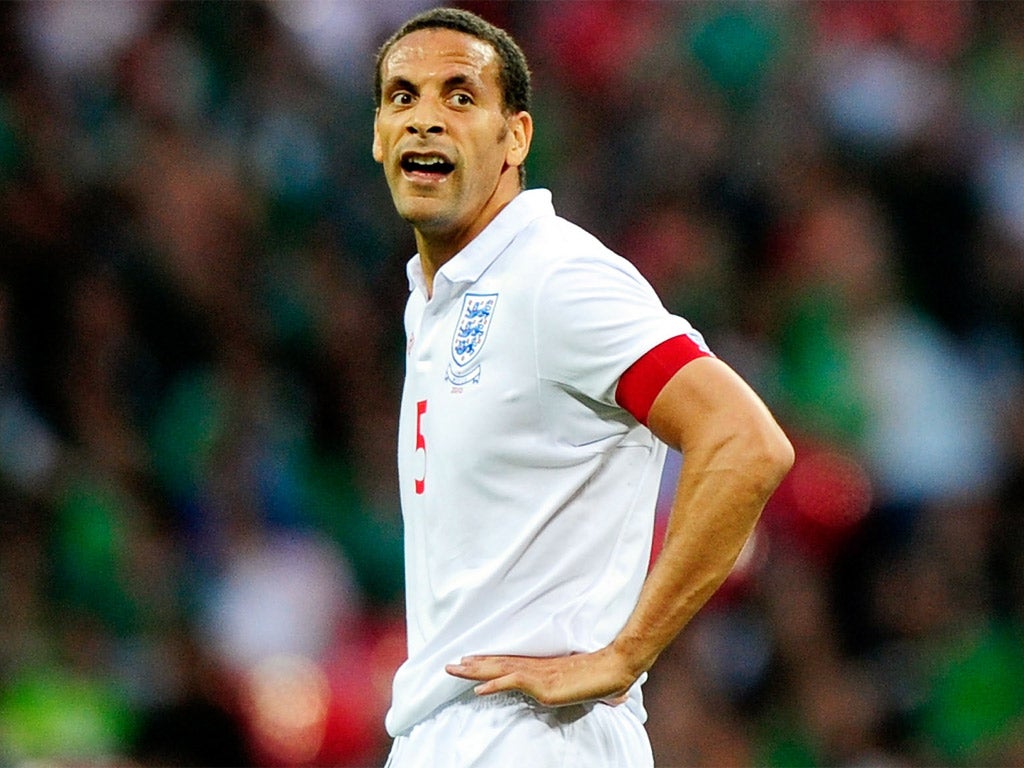Sam Wallace: End of an England era – and Rio Ferdinand will have a few regrets
A top player for England but he missed too many matches, tournaments and that drugs test

By any measure it has been a remarkable international career, and one that has survived more than its fair share of ups and downs, but having been left out of the Euro 2012 squad, Rio Ferdinand has surely now played his last game for England.
At the age of 33, he does not play as many games as he once did. He is by no means the player he was at his peak during the 2002 World Cup finals, the summer in which he joined Manchester United for £30m and was voted in Fifa's team of the tournament. But it will come as a huge blow to a character who has had to deal with disappointments in the past.
Two years ago he was preparing to lead England at the World Cup finals in South Africa, having been installed as captain by Fabio Capello after John Terry lost the job over the Vanessa Perroncel episode. As it turned out, Ferdinand turned his knee during the very first training session and spent the rest of the month on a pair of crutches, first watching from the touchline and then reluctantly accepting that he needed to go back to Britain for treatment.
It means that a player generally regarded as one of the most naturally talented defenders that English football has ever produced will only ever have represented his country at two major international tournaments, the World Cup finals of 2002 and 2006. He was in the squad for the 1998 World Cup finals as a 19-year-old but never played a game. He has never been in a squad for a European Championship.
In the case of Euro 2000, his form for West Ham tailed off towards the end of the season and manager Kevin Keegan decided to leave him out. He was serving his eight-month Football Association ban from football for a missed drugs test during Euro 2004. He was part of the Steve McClaren squad that did not qualify for Euro 2008. Yesterday the door closed on Euro 2012 too.
For all the problems that Ferdinand has had to face in his England career, and by his own account of it there will have been few more difficult than the FA ban, he has always had a habit of coming back from adversity. But in recent years injury has slowed him down to the extent that since the start of 2010 he has figured in just five of the 22 England internationals played.
It is also telling that Ferdinand has started just three of the 19 games that England have played since he broke down in South Africa in a fairly innocuous challenge for the ball with Emile Heskey. A total of 81 caps is an impressive return for an England international but given Ferdinand's status in the game he will surely have cause for regret at not reaching 100.
His last cap came against Switzerland in the Euro 2012 qualifier in June last year. That was the only time he played for Capello after the then England manager took the captaincy away from him, opening up a huge rift with the United player.
Capello had been concerned, with some justification, about Ferdinand's long-term fitness and the likelihood that he would be fit for this summer's European Championship. But it was the manner in which he told Ferdinand – or rather did not tell him – that damaged the relationship irrevocably. Capello's casual approach that he would speak to the player when he next bumped into him at Old Trafford was interpreted by Ferdinand, understandably, as a slight.
Ferdinand's best moments for England came during the 2002 World Cup finals in Japan and South Korea when his partnership in the centre of defence with Sol Campbell was among the best in international football. For another four years he and Terry were the mainstay of the England defence. Generally speaking, since the start of 2001, when Sven Goran Eriksson took over the team, Ferdinand has been an automatic first choice.
Only once did the Swede leave Ferdinand out of the side on the basis of form, against Austria in a World Cup qualifier in October 2005, a game which followed a humiliating defeat for England against Northern Ireland in Belfast. It was a rare occasion when Eriksson lost patience with his senior players and he made an example of Ferdinand, telling him in front of the squad at the start of the week that he was out.
Otherwise, whatever has happened to him, Ferdinand has remained a cornerstone of England managers' teams when he has been fit. As a 17-year-old he was regarded as such a prodigious talent that Terry Venables invited him, along with Frank Lampard, to train with the Euro 96 squad. He made his debut as 19-year-old in a friendly against Cameroon in 1997 and has captained the team on seven occasions. It would have been more were it not for injury.
He has one year left on his contract at United and beyond that it would not be hard to imagine a lucrative deal in China or in the MLS in America to see him through to retirement. As with many of England's most famous players, the end of his career has come abruptly. There would be many of his generation who would have been delighted with the international career that Ferdinand has enjoyed, but it will be hard for him to shift the feeling he could have played on for longer.
Subscribe to Independent Premium to bookmark this article
Want to bookmark your favourite articles and stories to read or reference later? Start your Independent Premium subscription today.

Join our commenting forum
Join thought-provoking conversations, follow other Independent readers and see their replies